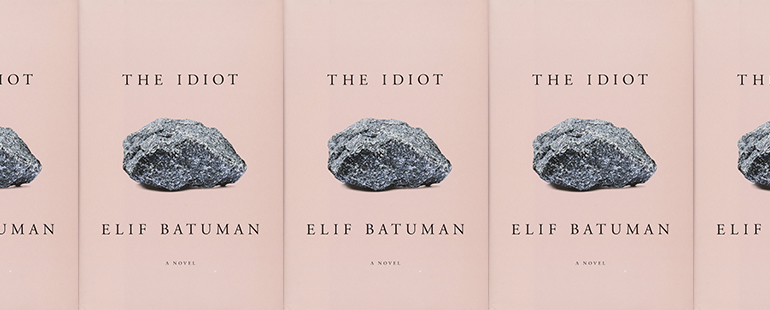The Idiot and the Betrayal of Language

When Selin Karadağ, the heroine of Elif Batuman’s 2017 novel, The Idiot, arrives for her freshman year at Harvard, she waits in a lot of lines, including at the bank, where she’s given a free dictionary for opening a new account. It’s a cheapo dictionary, useless for a college student; Selin complains to her roommate, Hannah, that it doesn’t contain entries for ratatouille or Tasmanian devil.
“Isn’t the Tasmanian devil a cartoon character?” Hannah asks dismissively.
This line makes a small but perceptive observation that underlies the novel: that what to one person is a word with a necessary function is, to another, a thing, an idea perhaps above the threshold of requiring explication. Words and things do not always correlate. Hannah doesn’t think of the Tasmanian devil as something that needs to be explained in words. You either know it or you don’t. Each of us has our own threshold for significance in language, and it’s that kind of distance in understanding that creates gaps in communication.
The Idiot is set in the year 1995, and the book makes a big deal about email, which, for those of us who attended college in the nineties, was a new and strange, occasionally cockamamie thing, with its chain letters, its new slang, its acronyms and etiquette. For Selin, email is “another world…always there, unchanged, in a configuration nobody else could see, was a glowing list of messages from all the people you knew, and from people you didn’t know, all in the same letters, like the universal handwriting of thought or of the world.”
Selin’s major is linguistics, and her first-semester classes—Linguistics, Russian, Constructed Worlds, the Nineteenth Century Novel and the City in Russia, England, and France—all challenge her to think about language in different ways. She is introduced to the Sapir-Whorf hypothesis of linguistic relativity, which posits that language informs how we receive and process experiences. “I knew I thought differently in Turkish and in English,” she says, “not because thought and language were the same, but because different languages forced you to think about different things.”
In her Russian class, Selin meets Ivan, a senior from Hungary with whom she becomes smitten. For conversation lessons, she is assigned the name Sonya while Ivan retains his Russian-sounding name. The two read passages from a story called “Nina in Siberia” that, because it is a text for learners, is limited in the grammar cases it can use. It’s a strangely gripping story for a language lesson, about a young woman whose lover, a physics student also named Ivan, has left her and run off to Siberia.
Selin and the real-life Ivan strike up an email correspondence, using the story as a framework for their early exchanges, rather than write about their real lives. The medium allows the pair, especially Ivan, to employ words as objects of performance, a tactic that seems to amuse Ivan but frustrates Selin: “I read the message several times,” she says. “I couldn’t seem to understand what it was about. The individual words and even the sentences made sense, sort of, but taken together, they seemed to have been written in some other language.”
Selin is often left having to explain herself throughout much of the The Idiot—especially to Ivan, who seems to enjoy breaking apart her sentences, willfully misinterpreting her for kicks. Then, in the natural way of young adult exploration, she overexplains to the point of sounding ludicrous. “I like words,” she tells a professor who’s interviewing her because she’s trying to get into a seminar. “They don’t bore me at all.” There’s a scene where Selin meets Dinah, a student she is tutoring:
“Oh, it’s the lady of the hour,” I said, because I was happy to see her and didn’t know what to say, and this was something I had heard people say before.
“What lady—who?”
“Nothing, I don’t know. It’s just good to see you.”
The Idiot has a lot to say about the apartness of worlds and lands, the fractured nature of language, and the insufficiency of words in getting ideas across even as new methods of communicating—of stretching and playing with those words—fall into our laps. But it also gets right the infuriating perplexity of young friendships, particularly between the sexes, when actions done out of nothing more than boredom become scrutinized and are then hyper-explained.
College is a time when young adults meet people from other backgrounds, and so it’s then that the differences in dialect, accent, and usage come to the fore as identifying characteristics. For Selin, facts of demography only offer a distraction in the effort to know a person. “How did you separate where someone was from, from who they were?” she asks. Lacking trust in getting to know people through pieces of their biography, she instead places an overzealous trust in language.
Surrounded by peers, we communicate in codes. But young adulthood is also a stage when we turn to language for functions other than communication. Words, particularly when they are written, turn out to be handy tool when we want to be coy or elusive, or for when we want to impress someone with our wit. This we often do at the expense of comprehension. “Your message wasn’t easy for me to understand,” Selin tells Ivan in an email. “I guess I’m too used to thinking of words as a means to an end.”
Ivan’s major is mathematics, which invites the idea that he might indeed think of words as means to end, but perhaps more specifically as devices that generate a result. While browsing in a bookstore, Selin comes across a book of lectures by Ivan Nabokov, in which he claims that arithmetic was invented by ancient peoples as “an artificial system designed to impose order on the world”:
Hadn’t the Greeks come up with the ellipse from doing solid geometry, from slicing up imaginary cones, and then centuries later, the ellipse turned out to describe the exact shape of planetary orbits? Hadn’t ancient people invented trigonometry, centuries before anyone knew that sound waves were shaped like sine waves? Fibonacci came up with the Fibonacci sequence just from adding up numbers, and then its ratio turned out to be encoded in the seed spirals on a sunflower. What if math turned out to explain how everything worked—not just physics but everything? Could that be what Ivan was studying?
After her freshman year concludes, Selin goes to Paris with her friend Svetlana, but ultimately her travels take her to Hungary, where she can be in Ivan’s vicinity. She boards with a succession of families and takes jobs teaching English, and the language barriers only enhance the bizarreness of her world and simultaneously intrigue and frustrate her curiosities.
But before that happens, as she and Svetlana are leaving, Selin spies Ivan at the airport, but isn’t sure it’s him—he’s gotten a haircut, and was supposed to have departed days before. When it turns out to indeed be Ivan, he’s initially cold to her—remembering the email she had sent at the end of the semester—and the conversations that follow end up being just as frustratingly elusive, built around posturing, as well as Ivan’s exploiting of the ridiculous nature of American idiom: “‘I’m supposed to be really hurt by your last email. And you’re supposed to be really pissed off. You’re not supposed to be making small talk.’ I knew ‘small talk’ was a phrase he had learned from me.”
Seeing Ivan in person forces Selin to change how she communicates with him. Their edited cleverness from the email exchanges don’t mean anything, but nonverbal cues like body language, averted gazes, and the lilt of sarcasm add complication.
As we realize the capacity of language to be a weapon, we find reasons to stop trusting it. Is what we are hearing supposed to be ironic? A straight-out lie? Are we being gaslit? Selin’s awareness of language’s dangerous potential only causes her to work over every statement she hears until the only thing of which she can convince herself is that she understands nothing.
And then there’s the question of Selin’s own first-person language, which she uses to tell a story to us, the reader. Her narrative sentences are deployed with the patience and weight of someone who has had time to consider what has transpired, but even here her lack of assurance in language comes through. In Hungary, she describes a character as having a “plain” face, then digresses on that odd choice of word: “Why was ‘plain’ a euphemism for ‘ugly,’ when the very hallmark of human beauty was its plainness, the symmetry and simplicity that always seemed so young and so innocent.”
Hungary also provides scenes of linguistic chaos, as Selin encounters people who don’t speak the English she knows while she doesn’t understand the Hungarian that they know. She is taught Hungarian by host families who point at objects and repeat words, hoping they will stick. The slow associations through which she deduces names and meanings make her realize the absurdities that exist in the spaces in between:
We came to the main road, with telephone and electric lines. “Telefon oszlop,” said Nóra. “Telefon oszlop, telefon oszlop, telefon oszlop. Elektromos oszlop.” I wasn’t sure what oszlop was, the pole or the line, until we came to a waist-height concrete column sticking out of the ground: “beton oszlop,” Nóra said. I knew beton was concrete—Turkish used the same word. It seemed so funny to me that you could have a telephone oszlop, an electric oszlop, or a concrete oszlop.
Batuman’s decision to set The Idiot in the era of the nascent internet illustrates what it has done to how we communicate. It has trained us to be hyperselective in our word choices—to look for the perfect keyword that will bring up the response we desire: to make the troll go away, to get the commenter who is clearly wrong to shut up. To fit our bon mots under the 280-character limit. To win someone over, or to feel like we have won.
The internet has equally demonstrated how language frustrates in its natural opaqueness, in its refusal to do what we intend it to do, to the point where we have sought alternatives. So we have expanded our arsenal to include emojis, GIFs—things that can, on the right occasion, impart an idea more pointedly than a word.
It’s easy, then, for the reader to sympathize with Selin’s frustrations. She wants to trust language, but language is inherently dishonest, a fractured mirror that never accurately reflects what really is. Trust it too much and it will leave you feeling betrayed.



